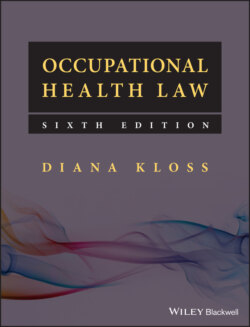Читать книгу Occupational Health Law - Diana Kloss - Страница 22
Workers’ rights and data protection after Brexit
ОглавлениеThe European Union (Withdrawal Agreement) Bill 2019–20 (WAB) has at time of writing (January 2020) passed successfully through the House of Commons. As, after the December 2019 General Election, the government has an overall majority in the House, it is almost certain to become law, though the House of Lords may attempt to make amendments. This Bill is a revision of that previously published in October 2019 before the election and no longer contains clauses on the protection of EU‐derived workers’ rights. In the December 2019 Queen’s Speech it was announced that protection for EU workers’ rights would be included in an Employment Bill which at time of writing has not been published. The problem is that, during the transition period after the UK leaves the EU on 31 January 2020 and the end of the transition period, currently fixed at 31 December 2020, a comprehensive agreement about trading arrangements and consequential measures will need to be negotiated with the EU. The EU may be unwilling to agree to provisions that allow the UK to deny workers’ rights that are protected by EU law, for example the right to paid holidays, protection under TUPE, the right to consultation when mass redundancies are proposed, and protection under health and safety and equality laws. Although UK law may already have provided some protection in these areas, EU directives and decisions of the Court of Justice of the European Union in many cases expanded it. If protection of workers is inferior in the UK to that in EU Member States the UK has an economic advantage which the EU may be unwilling to accept in a new trading agreement. The non‐binding Political Declaration negotiated between Johnson and the EU stated that the UK/EU agreement should have a level playing field clause, that is a clause that the UK would maintain employment standards at the current high levels provided by the existing common standards. However, in October 2019 the Financial Times reported that the government was looking to de‐regulate workers’ rights post‐Brexit, though this was denied by the Business Secretary in the House of Commons.
The Queen’s Speech announced the appointment of a new enforcement body for workers’ rights, and proposed extended redundancy payments protection and a new right for workers to request a ‘more predictable contract’. A National Skills Fund will be created to retrain the UK workforce.
As regards EU workers currently working in the UK, many in low paid jobs in healthcare, agriculture and catering and hospitality, the new immigration rules which will create an Australian style points‐based system will exclude most of these, giving rise to manpower problems. It has been proposed that such workers should be allowed entry on limited‐term visas to undertake particular tasks.
At the moment, because of the General Data Protection Regulation, the UK automatically follows EU data protection rules that allow the unfettered transfer of personal data across the bloc. This will fall away after Brexit. Without a fresh agreement companies will be banned from sending personal data electronically to Britain at the end of the transition period. This would be deeply destructive to business, especially services, including finance and telecommunications, many of whom rely on central data centres and large‐volume information flows. It would also damage the UK’s growing digital industry as well as jeopardising security and crime intelligence co‐operation.
In the event that no agreement is reached by December 2020 and no extension to the transition period is agreed the UK will leave without a deal and will operate under World Trade Organisation rules.
